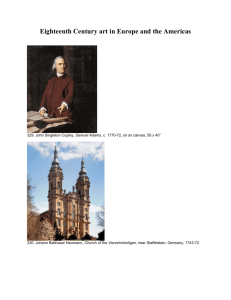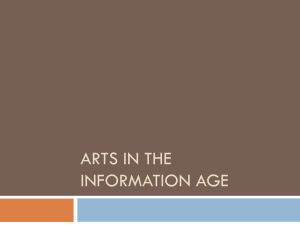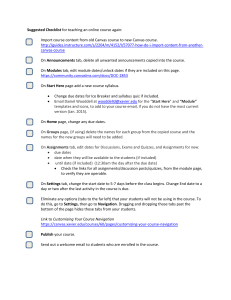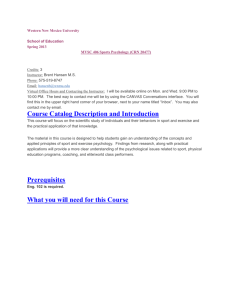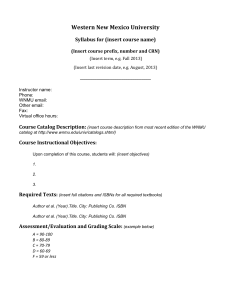CJUS 210 CRN 20405.20406.20408
advertisement
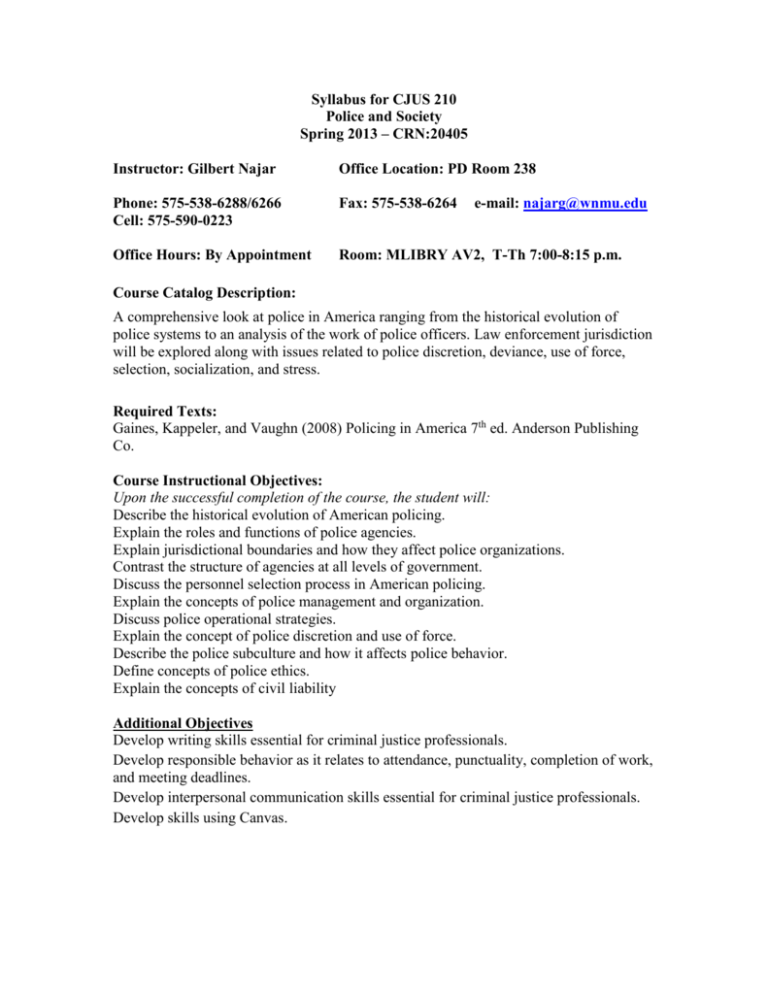
Syllabus for CJUS 210 Police and Society Spring 2013 – CRN:20405 Instructor: Gilbert Najar Office Location: PD Room 238 Phone: 575-538-6288/6266 Cell: 575-590-0223 Fax: 575-538-6264 Office Hours: By Appointment Room: MLIBRY AV2, T-Th 7:00-8:15 p.m. e-mail: najarg@wnmu.edu Course Catalog Description: A comprehensive look at police in America ranging from the historical evolution of police systems to an analysis of the work of police officers. Law enforcement jurisdiction will be explored along with issues related to police discretion, deviance, use of force, selection, socialization, and stress. Required Texts: Gaines, Kappeler, and Vaughn (2008) Policing in America 7th ed. Anderson Publishing Co. Course Instructional Objectives: Upon the successful completion of the course, the student will: Describe the historical evolution of American policing. Explain the roles and functions of police agencies. Explain jurisdictional boundaries and how they affect police organizations. Contrast the structure of agencies at all levels of government. Discuss the personnel selection process in American policing. Explain the concepts of police management and organization. Discuss police operational strategies. Explain the concept of police discretion and use of force. Describe the police subculture and how it affects police behavior. Define concepts of police ethics. Explain the concepts of civil liability Additional Objectives Develop writing skills essential for criminal justice professionals. Develop responsible behavior as it relates to attendance, punctuality, completion of work, and meeting deadlines. Develop interpersonal communication skills essential for criminal justice professionals. Develop skills using Canvas. Evaluation and Grading Scale The grades in this course are A,B,C,D, and F. All work will be graded on a 500 point scale. Final grades will be determined as follows: 550-600 points = A- Superior 500-549 points = B- Good 450-499 points = C- Average 400-449 points = D- Poor 000-399 points = F- Failing The following point scale will be used for the course requirements: Essay questions 40 points (2 essays @ 20 points each) Group Presentations 30 points (3 @ 10 points each) Quizzes 130 points (13 quizzes @ 10 points each) Term Paper 200 points Mid-term exam 100 points Final exam 100 points Total 600 points Canvas This course will be conducted using Canvas as a supplementary tool for viewing Course Power Points, viewing Videos, taking Quizzes and Exams, submitting Assignments and Communicating by e-mail with the instructor. A tutorial is available for students not familiar with Blackboard. All assignments will be submitted electronically through Canvas. No “hard copy” paper assignments will be accepted. Students must use Microsoft Word or any word processing program that is compatible with Microsoft Office 2010 when submitting assignments. Assignments / Due Dates All written assignments must be word-processed using a standard font no larger than size 12. All assignments are strictly due on their respective due dates. Exceptions for legitimate reasons may be made at the discretion of the instructor. If you have an issue concerning this please discuss it with the instructor before the due date. Otherwise, work is due as assigned. Assignment Requirements Assignments in this course have requirements for length and format. Requirements are not optional. They must be met. Students choosing to turn in assignments not meeting requirements will receive no credit for the assignment. Partial credit will not be given. Weekly Quizzes: After completing the reading assignments, and reviewing the chapter Power Point, the student will take a short multiple choice quiz on the material in Canvas. Essay Question Assignments: Various essay questions will be assigned on the course topics. Essays should be arranged in three parts: introduction, body, and conclusion. The introduction should capture the reader’s attention, announce the purpose of the essay and present the essay’s theme. The body sequences the points of the essay in a way that is logical and that flows from one point to the next. The conclusion summarizes the points made in the essay, emphasizing the essay’s theme and brings a sense of completion. It is not enough to present the “right” answer to a question. The purpose of this exercise is to assist the student in developing skills in writing complete thoughts in a manner that is supported by evidence, easily readable, and understood. A total of 2 essay question assignments will be given throughout the semester graded on a 10 point scale. Essays must be a minimum of 350 words. Students may find it helpful to research the topics when writing essays. All research information must be cited using APA style. A helpful website: http://owl.english.purdue.edu/owl/section/2/10/. Plagiarism is a serious violation of WNMU’s academic integrity policy. By learning to properly cite sources, you can avoid costly errors. Any essay question, turned in on time, can be re-written for a better grade. All re-writes must be turned in within 2 weeks of the student receiving the graded paper. Term Paper: A scholarly term paper on a police related topic is required for this course. Topics must be approved by the instructor before you begin your paper. A written proposal for your paper topic is required. This proposal should explain your topic and why you have chosen it. Term papers must be a minimum of 1800 words (this excludes title page, abstract and reference page) and have at least 5 references. (Wikipedia and any other online type encyclopedias are NOT valid references.) APA style is required. Papers are due as follows: Topic Proposal Due: Final Term Paper Due: February 12 April 18 Revised Paper: Apr. 25 Term papers will be graded using the following rubric: Topic Proposal APA style Topic coverage Syntax Total 20 pts 20 pts 140 pts 20 pts 200 pts Students who have turned in a paper that meets all requirements will be given an opportunity for improvement through revision. Revised papers will receive no more than 50 additional points above the original paper. Students who choose to turn in a paper that does not meet requirements are cautioned that no partial credit will be given. This may result in failure of the course since this assignment is worth 30% of the total grade. Make sure your paper meets all requirements before you submit it. Examinations: There are two exams given in this course. They are a combination of multiple choice and tru/false questions. Prior to each exam you should review your quizzes and chapter Power Points to assist you in preparing for the exam. Exams will be given as follows: Mid-term Exam- Open February 25, due March 1, 11:59 PM Final Exam- Open May 6, due May 9, 11:59 PM The instructor reserves the right to revise this syllabus as necessary. Students will be advised of any changes. It is the ultimate responsibility of the student to be aware of changes made to the syllabus. Week 0. Jan. 10- Introduction, syllabus. The Police In American Society. Week 1. Jan. 15- Read Chapter 1 before class (Pages 1-47). Review Power Point before class – Chapter 1 (Canvas) Quiz Chapter 1 – Open January 10, due January 22 (Canvas Jan 17 – Read Chapter 2 Historical Perspectives. Read Chapter 2 before class (Pages 51-86). Review Power Point before class – Chapter 2 (Canvas) Quiz Chapter 2 – Open January 15, due January 31 (Canvas) Week 2 Jan. 22- Chapter 2 Continued. Jan. 24 – Chapter 11 The Police in the Modern Community Read Chapter 11 before class (Pages 411-439). Review Power Point before class – Chapter 11 (Canvas) Quiz Chapter 11 – Open January 15, due January 31 (Canvas) Week 3 Jan. 29 – Police Academy Video – Chris Braiden “Demystifying Community Policing” View DVD on COP’s before class Essay # 1, Due Feb 5 – “Demystify Community Policing” Discussion of Topic Proposals for Term Paper due on Feb 12 (electronic). Jan. 31 – Chapter 3 Police Human Resources Read Chapter 3 before class (Pages 89-131). Review Power Point before class – Chapter 3 (Canvas) Quiz Chapter 3 – Open January 24, due January 29 (Canvas) Week 4 Feb. 5- Organization and Management. Read Chapter 4 before class (Pages 139-167). Review Power Point before class – Chapter 4 (Canvas) Quiz Chapter 4 – Open January 24, due Feb 12 (Canvas) Essay #1 due. Feb. 7 – Chapter 5 Police Operations Read Chapter 5 before class (Pages 171-214). Review Power Point before class – Chapter 5 (Canvas) Quiz Chapter 5 – Open January 31, due Feb. 14 (Canvas) Week 5 Feb. 12- Chapter 6 Police Discretion. Read Chapter 6 before class (Pages 219-256). Review Power Point before class – Chapter 6 (Canvas) Quiz Chapter 6 – Open Feb. 5, due Feb. 19 (Canvas) Topic Proposals Due for Term Paper (electronic). Feb. 14- Chapter 10 Civil Liability Read Chapter 10 before class (Pages 377-406). Review Power Point before class – Chapter 10 (Canvas) Quiz Chapter 10 – Open Feb. 5, due Feb. 21 (Canvas) Week 6 Feb. 19- Chapter 7 Police Use of Force Read Chapter 7 before class (Pages 265-294). Review Power Point before class – Chapter 7 (Canvas) Quiz Chapter 10 – Open Feb. 12, due Feb. 26 (Canvas) Feb. 21- Chapter 8 Police Culture and Behavior Read Chapter 8 before class (Pages 299-331). Review Power Point before class – Chapter 8 (Canvas) Quiz Chapter 8 – Open Feb. 14, due Feb. 28 (Canvas) Week 7 Feb. 26- Police Corruption (Part 1) Read Article before class by Neal Trautman, “How and Why a Department or Jail Becomes Corrupt”(Canvas). Feb. 28- Police Corruption (Part 2) Read Article before class by Neal Trautman, “Police Code of Silence”(Canvas). Mar. 4-8 Spring Break Week 8 Mar. 12 – Chapter 9 Ethics and Deviance Read Chapter 9 before class (Pages 337-373). Review Power Point before class – Chapter 9 (Canvas) Quiz Chapter 9 – Open Feb. 26, due Mar. 19 (Canvas) Mar. 14 – Organizational Ethics View DVD before class on “Lucifer Effect” Dr. Phil Zimbardo View DVD before class on “Power Postures” Amy Cuddy Essay # 2– Individual and Organizational Ethics in Policing- Due Mar 26 Group Assignment 1: “The Rotten Apple” due Mar 21/26 Week 9 Mar. 19- The “Lucifer Effect” Review PowerPoint before class on “Lucifer Effect” Classroom Group Time Mar. 21 – Group Presentations Assignment 1: “The Rotten Apple” Week 10 Mar 26 – Group Presentations Assignment 1: “The Rotten Apple” Mar. 28- Chapter 12 Policing the Drug Problem Read Chapter 12 before class (Pages 445-478). Review Power Point before class – Chapter 12 (Canvas) Quiz Chapter 12 – Open Mar. 21, due Apr. 4 (Canvas) Group Assignment 2: “The Drug Problem” due Apr. 11/16 Week 11 Apr 2 - Diversity, Inclusion, Cultural Competence - Part 1 Review Power Point before class before class – “Diversity, Inclusion..” Slides 1-35 (Canvas) Group Assignment 3: Policing and Cultural Comp due Apr. 25/30 Apr. 4 - Diversity, Inclusion, Cultural Competence - Part 2 Review Power Point before class before class – “Diversity, Inclusion…” Slides 36-75 (Canvas) Week 12 Apr. 9- Diversity, Inclusion, Cultural Competence - Part 3 Review Power Point before class before class – “Diversity, Inclusion…” Slides 76-139 (Canvas) Apr. 11- Group Presentations #2: “The Drug Problem” Week 13 Apr. 16 – Group Presentations #2: “The Drug Problem” Apr. 18- Chapter 13 Globalization, Terrorism and Homeland Security - Part 1 Read Chapter 13 before class (Pages 483-521). Review Power Point before class – Chapter 13 (Canvas) Quiz Chapter 13 – Open Apr. 11, due Apr.25 (Canvas) Final day for submission of Term paper Week 14 Apr. 23.- Globalization, Terrorism, and Homeland Security Part 2 Review PowerPoint before class- “Terrorism” (Canvas) Apr. 25 - Group Presentations #3: “Policing and Cultural Competence Final day for submission of revised term paper. Week 15 Apr. 30 Group Presentations #3: “Policing and Cultural Competence May 2 Closing Comments. Review for Final Exam Week 16 May 6-9 Final Exam Other expectations Writing skills are essential for criminal justice professionals. All written assignments in this course should be free of grammatical errors and/or misspellings. Please proofread your work! Use spell check and grammar check on the computer! Required Writing Center Assistance: Any student deemed by the instructor to require improvement in writing skills will be referred to the Writing Center. Such a referral is mandatory. Proof of assistance will be required. This requirement will continue until the instructor determines it is no longer necessary, based on student progress. Required Back-up storage media Back up storage media are required for this course. Computer failure will not be accepted as a legitimate excuse for late work. Save all your work on a jump drive or other similar device. Attendance: Class absences are noted and may result in class dismissal if the absences interfere with successful meeting of the requirements of the course in accordance with WNMU policy. When absences are required, students must advise the instructor ahead of time. (Email is best) No work or exams may be made up if prior notification of absences is not made. Please be responsible! Exceptions for legitimate emergency circumstances may be made at the discretion of the instructor. Punctuality: This course meets weekly at 2:00 PM, Monday and Wednesday. Tardiness is disruptive to those who have made an effort to arrive on time, therefore it is unacceptable. Please make a habit of doing whatever is required to arrive on time. Cellular Phones: As useful as cell phones are, they unfortunately often become a problem in class. Cell phones must be turned off at the beginning of class. If you have a legitimate reason for needing your cell phone on (i.e. kids at home, work etc.) please discuss this with the instructor. Disability Support Services: Services for students with disabilities are provided through the Student Health Center’s Disability Support Services Office located in the Juan Chacon Building, Room 221. Some examples of the assistance provided are: audio materials for the blind or dyslexic, note takers, readers, campus guides, audio recorders, and a quiet testing area. In order to qualify for these services, documentation must be provided by certified health care professionals. Disability Support Services forms are available in the First Year Experience Office located in the Juan Chacon Building and in the Student Health Services Office in Muir Heights 111. The Disability Support Services Office serves as Western New Mexico University's liaison for students with disabilities. The Disability Support Services Office can be contacted by phone at (575) 538-6400 or e-mail at dss@wnmu.edu. Communication Policy Statement regarding official email : WNMU’s policy requires that all official communication be sent via Mustang Express. As a result, all emails related to your enrollment at WNMU and class communication – including changes in assignments and grades – will be sent to your wnmu.edu email address. It is very important that you access your Mustang Express e-mail periodically to check for correspondence from the University. If you receive most of your email at a different address you can forward your messages from Mustang Express to your other address. Example: Martin Classmember was assigned a WNMU email address of classmemberm12@wnmu.edu but Martin would rather receive his emails at his home email address of martinclass@yahoo.com Martin would follow the direction provided at http://www.wnmu.edu/campusdocs/direction%20for%20forwarding%20ema il.htm WNMU Policy on Email Passwords: WNMU requires that passwords for access to all of the protected software, programs, and applications will be robust, including complexity in the number of characters required, the combination of characters required, and the frequency in which passwords are required to be changed. Minimum complexity shall include: Passwords shall contain at least six (6) characters. Passwords shall contain at least one capital (upper case) letter, and at least one symbol (numbers and characters such as @ # $ % & *). Passwords shall be changed at least every 90 days. (8/6/08) Academic Integrity Policy and Procedures: Each student shall observe standards of honesty and integrity in academic work as defined in the WNMU catalog. Violations of academic integrity include “any behavior that misrepresents or falsifies a student’s knowledge, skills or ability with the goal of unjustified or illegitimate evaluation or gain” (WNMU Faculty Handbook, 2008). Generally violations of the academic integrity include cheating and plagiarism. Refer to the catalog pages 60-61 for definitions. Penalties for infractions of academic integrity in this class are as follows: Plagiarism: “the intentional or unintentional representation of another’s work as one’s own without proper acknowledgement of the original author or creator of the work” (WNMU Faculty Handbook, 2008). The appropriate penalty for acts of scholastic dishonesty can range from course “Failure” on a particular assignment to suspension from the University, depending on the instructor’s evaluation of the severity of the offense, and whether or not the student has committed prior acts of scholastic dishonesty. Cheating: “using or attempting to use unauthorized materials…and unauthorized collaboration with others, copying the work of another or any action that presents the work of others to misrepresent the student’s knowledge” (WNMU Faculty Handbook, 2008). The appropriate penalty for acts of scholastic dishonesty can range from course “Failure” on a particular assignment to suspension from the University, depending on the instructor’s evaluation of the severity of the offense, and whether or not the student has committed prior acts of scholastic dishonesty. Class Procedures for Inclement Weather: The decision on whether to close the University will be based on the condition of the campus streets and parking lots and the surrounding main arteries. It will also take into consideration when Law Enforcement close down roads in and out of Silver City, Deming, Lordsburg, and Truth or Consequences. The University’s inclement weather procedures will be communicated to the entire University, as deemed necessary. Weather closing/delay information will be made available in the following ways: 1. 2. 3. 4. 5. 6. WNMU webpage WNMU Mustang Express Radio Stations a. KNFT-FM 102.9FM (Silver City) b. KPSA-FM 37.7FM (Lordsburg) c. KSCQ-FM 92.9FM (Silver City) d. KDEM FM 94.3FM (Deming) e. KCHS 1400 AM (Truth or Consequences) TV Stations a. KOAT – TV (Albuquerque) b. KOB – TV (Albuquerque) c. KRQE – TV (Albuquerque) WNMU Facebook Page WNMU Twitter Page Closing Procedures 1. The President or the President’s designee will make any decisions regarding university closing. The Director of Communications or the Director’s designee will communicate this decision to TV stations, radio stations, and the Director of Information Technology or the DIT designee. 2. During the weekends, the decision to close the Library, Museum, or the Computer Labs due to inclement weather will be made by the appropriate director and communicated to the Director of Communications/designee. The Director of Communications/designee will communicate the closure(s) to the TV and radio stations and the DIT/designee as appropriate. 3. Every attempt will be made to have the closure announcement made by 6 am. Late Opening or Early Closing Procedures 1. The President or the President’s designee will make any decisions regarding university opening late or closing early. The Director of Communications or the Director’s designee will communicate this decision to TV stations, radio stations, and the Director of Information Technology or the DIT designee. 2. When WNMU’s opening is delayed, the opening will coincide with that day’s class and/or exam schedules. A precise opening time, such as 10am or 11am will be announced. 3. Every attempt will be made to have the delayed opening announcement made by 6am. 4. During the day, the announcement to shorten the workday with an early closing or cancellations of evening classes will normally be made by 3pm. Staff Considerations 1. Announced closures should be reported as administrative leave on non-exempt Payroll Time Reports (Time Sheets) and shall not be considered as time worked for overtime compensation purposes. 2. At the beginning of each fiscal year (July – June) each employee will be allotted 8 hours to be used for inclement weather. Inclement Weather Leave may not be carried over from one fiscal year to another. Employees must notify his/her immediate supervisor or designee when he/she is unable to report to work and utilizing Inclement Weather Leave (Designated as WEA on his/her time sheet or leave slip). If any employee uses all of his/her Inclement Weather Leave then compensatory time off must used then annual leave if available. 3. “Essential employees” are those employees required to work during emergency closings because their positions have been designated as essential to specific operations. “Essential employees” include physical plant workers, University Police, food services, and health services employees. “Essential non-exempt employees” required to work during University closing will receive compensatory time off (comp. time as per page 37 of the WNMU Staff Handbook). Faculty Considerations 1. Academic deans and department chairs will ask faculty to discuss the University’s inclement weather procedures with their classes and make known their expectations and plans of actions, including review of how students will be informed of weather-related classroom decisions such as via e-mail, a phone tree, or posting on Mustang Express. Faculty should notify their department office if classes are cancelled. 2. When the weather is bad but the University remains open, some students may be unable to get to class because of treacherous conditions. Faculty should take this into consideration. 3. Academic departments should make every effort to inform students when an individual faculty member is unable to make it to campus because of inclement weather. 4. Departments should establish procedures for letting students know when classes are cancelled. 5. In the event of delays or closures during final exam week, faculty whose final exams are affected by the delay or closure may elect one of three options. Faculty must choose one of the options prior to final exam week and clearly communicate to their students in their syllabus which option they have chosen. The options are as follows: a. Faculty may assign as final grades, the current grades that student have going into final exam week. b. Faculty may make provisions for students whose exams are canceled to contact them for scheduling a make-up exam or alternative arrangements. c. Faculty may, as a last resort, choose to assign incomplete grades. Outside Groups/Renters 1. On days of early closings, external groups sponsoring events complete those events at their own risk. 2. On occasion, the University staff may not be able to open and close a facility. If this situation occurs, the external groups will be notified by the Special Events Office or the Fine Arts Center Theatre Director as appropriate and the event must be cancelled or re-scheduled. Criminal Justice and Chemical Dependency Department Policy Statement on Scholastic Integrity Introduction: The success of any academic program is dependent upon the perception by students, faculty and potential employers that students are evaluated fairly on the basis of their own work. While it is impossible to create an environment that is completely free of opportunities and temptations to behave unethically, it is in the best interests of all students to avoid committing acts of scholastic dishonesty and to discourage others from doing so. The department prepares students for careers in which honesty and ethical behavior are essential. Acts of scholastic dishonesty lower the value of the degree and the honest work of other students. It is the responsibility of each student to understand the definition of unethical behavior and to resist the temptation to commit acts of scholastic dishonesty. Responsibilities of the Students: 1. To understand the definition of scholastic dishonesty: “Scholastic dishonesty” includes, but is not limited to, cheating, plagiarism, collusion, falsifying scholastic records, and any act designed to give unfair advantage to the student, or the attempt to commit such an act. Cheating includes, but is not limited to the following: a. Copying from another student’s test paper. b. During a test using materials not authorized by the person giving the test. c. Failing to comply with instructions given by the person administering the test. d. Possession during a test of materials which are not authorized by the person giving the test, such as class notes or specifically designed “crib notes.” The presence of textbooks constitutes a violation only if they have been specifically prohibited by the person administering the test. e. Using, buying, stealing, transporting, or soliciting in whole or part the contents of an unadministered test, test key, homework solution, or computer program. Note: This includes obtaining or providing a solution for current semester assignments that are the same as, or similar to, assignments that were used in previous semesters or were otherwise available. f. Collaborating with or seeking aid from another person during a test or other assignment without authority. Any assistance on a graded assignment is prohibited unless authorized by the instructor in advance. g. Discussing the contents of an examination with another student who will take the examination. h. Paying or offering money or other valuable thing to, or coercing another person to obtain an unadministered test, test key, homework solution, or computer program, or information about an unadministered test, test key, homework solution, or computer program. i. Falsifying research data, laboratory reports, and/or other academic work offered for credit. Plagiarism includes, but is not limited to, the appropriation, buying, receiving as a gift, or obtaining by any means another’s work and the submission of it as one’s own academic work offered for credit. A student could commit plagiarism by copying his or her own work without referencing it adequately. For example, if a student completes an assignment, and then uses all or a portion of that assignment as full or partial completion of another assignment, in the same class or in a different class, without disclosing the source of the material for the second assignment, the student has committed plagiarism. Collusion includes, but is not limited to, the unauthorized collaboration with another person in preparing academic assignments offered for credit or collaboration with another person to commit a violation of any section of the rules on scholastic dishonesty. It is the responsibility of the instructor to provide clear instructions on the extent of collaboration that is acceptable, and it is the responsibility of the student to understand and to conform to those instructions. 2. To understand the instructions for each assignment, quiz or examination. It is the responsibility of the student to understand the instructions for each assignment, the degree of collaboration allowed, and to ask the instructor for clarification whenever necessary. 3. To refrain from committing any acts of scholastic dishonesty. Despite the fact that some assignments are extremely challenging, the difficulty of an assignment does not constitute an excuse to behave dishonestly. 4. To take appropriate action when acts of scholastic dishonesty are observed. To remain passive when dishonest behavior occurs is to condone and encourage. Lack of action allows dishonest students to victimize all of the honest students in the program. Appropriate actions include confronting the student who has committed the act and reporting the observed behavior to the instructor. Responsibilities of the Faculty: 1. To communicate clearly the instructions for each assignment. The instructor should clearly indicate to what extent the student may and may not collaborate on out-of-class assignments, and what other resources (books, computers, databases, etc.) may be used on out-of-class assignments. 2. To design assignments that minimize the opportunity for scholastic dishonesty while still achieving the educational objectives of the assignments. 3. To evaluate assignments on the basis of reasonable expectations given the difficulty of the assignments. 4. To actively and consistently enforce the University rules governing scholastic dishonesty. The appropriate penalty for acts of scholastic dishonesty can range from an “F” on a particular assignment to suspension from the University, depending on the instructor’s evaluation of the severity of the offense, and whether or not the student has committed prior acts of scholastic dishonesty.

